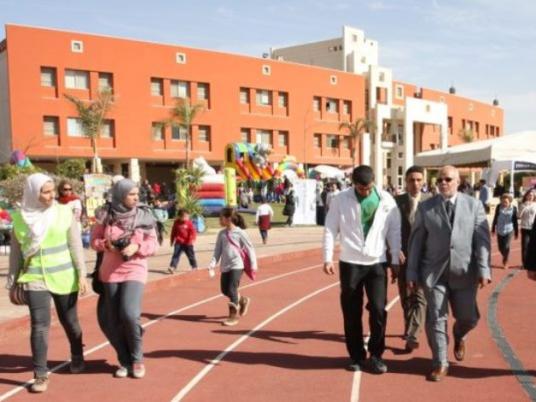
The Hayah International Academy hosted the “Walk for the Nile” initiative on Friday for the fourth time, in collaboration with the Irrigation and Water Resources Ministry. The campaign aims to raise funds to clean up Abul Menagga Canal, a 19-kilometer-long water stream in Daqahlia, to provide clean water to hundreds of thousands of people living in the area.
The event hosted some NGOs and provided them with booths to expose their projects about girls’ education, orphan care or any other developmental goal. The Nutty Scientists group also presented a show about the value of recycling to the schoolchildren. In all, the event raised LE60,000, which exceeded the original target of LE32,000 to clean up an extra 13-kilometer stretch of the canal.
The first walkathon at the school took place in April 2010. Participants organized a six-kilometer walk as part of the Live Earth Run for Water event, organized by former US Vice President Al Gore to increase awareness about the importance of water and its challenges.
In more than 190 countries, young people walked and ran the symbolic distance of six kilometers, which is the average distance many women and children walk every day to the nearest well to draw water. Organizers also set up water education activities.
The school's first event in April 2010 raised LE105,000, a sum that was later spent on the construction of a well in a poor Upper Egyptian village and a project to connect two villages close to Alexandria to a running water system.
“Because the school gives high attention to community services, the students were excited to participate to such an important, worldwide event,” says Sherine Diaa, the head of Hayah Academy's events department.
In 2011, for the second walkathon dubbed "Walk for a Cause," the Hayah academy contacted the Irrigation and Water Resources Ministry to ask the ministry which project the academy could invest in next. The ministry recommended focusing their efforts on a partial cleanup of Abul Menagga Canal, which irrigates 50,000 agricultural acres and serves a population of 2 million.
Industrial waste and garbage has polluted the canal for more than a decade. Over time, the accumulation of waste completely blocked the canal and would not allow water to enter its 32 sub-channels to properly irrigate the surrounding area. This eventually deprived nearby villages and cities of clean water to drink and grow food with and also caused many diseases.
With the money raised during the first and second years of the initiative, the school began cleanup of a 40-meter-long canal stretch in 2011 by removing more than 40 tons of garbage with the help of 70 trucks. The amount of electricity needed to keep the water going dramatically decreased because the water could flow freely, and fewer electric pumps were needed. The cleanup is continuing, one stretch at a time.
Diaa says that last year, Hesham Qandil, then water resources and irrigation minister, and then-Prime Minister Kamal al-Ganzouri attended the academy’s sporting event with his sneakers on and participated in the walk.
“He expressed his hope to expand the initiative to the other surrounding schools. Although we sent them a lot of invitations to join the initiative, they have not yet taken action,”Diaa says.
Sarah al-Rifai, the school’s creativity, action and service program coordinator, explains how the initiative blends environment awareness, sports and arts.
“The event mainly takes place in the form of a walkathon in the school track fields, where students come and ask their friends, family and relatives to sponsor every lap for money. The more money the participants get, the more laps they have to run,” she says. “However, it’s not merely donating money — the event also involves other means of physical and artistic activities.”
To promote the Nile canal cleanup, Rifai explains, students made special booths, mugs, T-shirts and flyers. Arabic-language students wrote poetry about water and sold it to raise funds. The academy also organized a football tournament for 14 teams.
Art activities included pottery, face painting and sand art, and a special art auction corner displayed easels, allowing kids to paint and reproduce pictures. The paintings were then put up for auction to raise additional funds.
Rifai says the activities also aimed to raise students’ awareness about the importance of the Nile and the necessity of protecting it.
“We made documentaries, posters and photos about the canal cleanup process to let people see for themselves where their money is going and how it can improves other people’s lives,” she says.
Rifai explains that representatives from the school’s events department go every year to witness the canal before, during and after the cleanup. They also plan to bring groups of children to witness the actual cleaning process and participate.
The 2013 walkathon started right after Friday prayers, and Mohamed Ramy, a teenage student at the school, walked 77 laps, winning first place and breaking last year’s record.
"I participated in the marathon because I love Egypt and believe that every one has to carry the responsibility of developing and improving this country," says Ramy.
"I got sponsorship from my friend's company and I encouraged my family and friends to come to watch me running and donate for the initiative. In my opinion, such project must be generalized in the different schools across Egypt to help clean multiple canals and help more people," he adds.
Water Resources and Irrigation Minister Mohamed Bahaa Eddin gave a speech about underground water and Egyptians' wrong perceptions about the Nile and its pollution, and also donated LE500.
"Egypt's irrigation map is ranked the second most complicated irrigation map in the whole world after India. The government needs help and support from civil society associations as it doesn't have the enough budget to do everything on its own," says Diaa. "Also, people need to understand that the Nile is Egypt's main source of life and that it's everyone’s responsibility to protect it."
